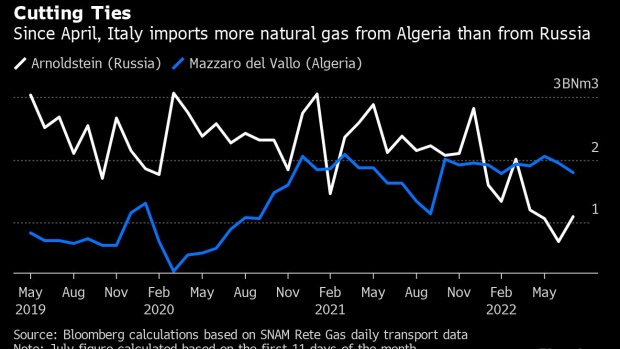Jul 13, 2022
Ukraine Latest: Italy Leads Europe in Cutting Russia Gas Imports
, Bloomberg News

(Bloomberg) -- Italy has done more to reduce its dependency on Russian gas imports than any other country in Europe five months after Vladimir Putin’s invasion of Ukraine sparked a global energy crisis.
The country now relies on Russia for about a quarter of its gas imports, down from about 40% at the start of the year. Germany, Europe’s biggest economy, still imports about 35% of its needs from Russia.
Canada’s agreement to export a natural-gas turbine back to Germany for use in the Nord Stream pipeline for supplies from Russia could last longer than expected, a newspaper report said.
The death toll from a Russian rocket strike on an apartment building in the Donetsk region rose to 46, according to Ukraine’s emergency services, as the Kremlin’s forces pressed forward with their ground assault on the east.
(See RSAN on the Bloomberg Terminal for the Russian Sanctions Dashboard.)
Key Developments
- Higher Oil Prices Are Poised to Last for Months, If Not Years
- Italy Pulls Ahead in European Rush to Cut Russia-Gas Dependency
- US Democrats Urge New $650 Billion IMF Aid on Ukraine War Hit
- What If? Markets Plan Doomsday If Russia Turns Off the Gas
On the Ground
Ukrainian rescue workers are still recovering bodies from the debris of a five-storey apartment block where at least 46 people were killed, according to the State Emergencies Service. Russian rockets hit the building near Kramatorsk in Ukraine’s eastern Donetsk region over the weekend, in one of the deadliest such attacks of the war. Russian forces continued shelling the Slovyansk area, according to Ukraine General Staff statement. Russia also struck the Dnipro region further west overnight, the regional governor, Valentyn Reznichenko, said on his Telegram account.
(All times CET)
Italy Pulls Ahead Cutting Russia Reliance (7:00 a.m.)
Nearly five months after Russia’s invasion of Ukraine sparked a global energy crisis, Italy is pulling ahead in reducing its dependency on Moscow.
Across the European Union, governments are rushing to fill gas storage sites and considering alternative energy supplies, even at a potential cost to the environment. Russia has already curtailed shipments to Italy, which is in the midst of a climate emergency, and officials in Rome are bracing for further cuts.
Read more: Italy Pulls Ahead in European Rush to Cut Russia-Gas Dependency
China’s Trade With Russia Increases (4:49 a.m.)
China’s total trade with Russia was worth 519 billion yuan ($77 billion) in the first half of the year, up 27% from the same period in 2021, according to China Customs. In the first five months of the year, exports to Russia have slumped while imports jumped. Most of China’s imports from Russia are oil, gas and coal.
The US has stepped up criticism of China for its diplomatic support of Russia following the start of the war, which has contributed to surging inflation around the globe. Washington has warned Beijing, which declared a “no limits” friendship with Russia shortly before the February invasion, that its companies and officials could face sanctions if the country moves to assist Putin’s war.
Read more: Blinken Blasts China’s Support for Russia, Calls Out Xi
Canada Turbine Deal Covers 2 Years: Globe (1:02 a.m.)
Canada’s agreement to allow the repair of Russian-owned turbines covers a period of as long as two years from now and would permit the import and re-export of six units, the Globe & Mail newspaper reported, citing two unidentified government officials.
It’s a much more extensive and long-lasting arrangement than was previously disclosed, the newspaper said. The arrangement allows Canada to revoke the sanction-relief permits at any time, it cited one of the officials as saying.
German officials have urged Canada to find a way to return the turbine, fearing Russia would use the issue as an excuse to shut down Nord Stream and cripple Germany’s ability to fill its gas storage tanks ahead of winter. The export decision was made over the objections of Ukraine’s government, which argued sending the pressurization turbine back would undermine the sanctions regime against Russia.
©2022 Bloomberg L.P.







